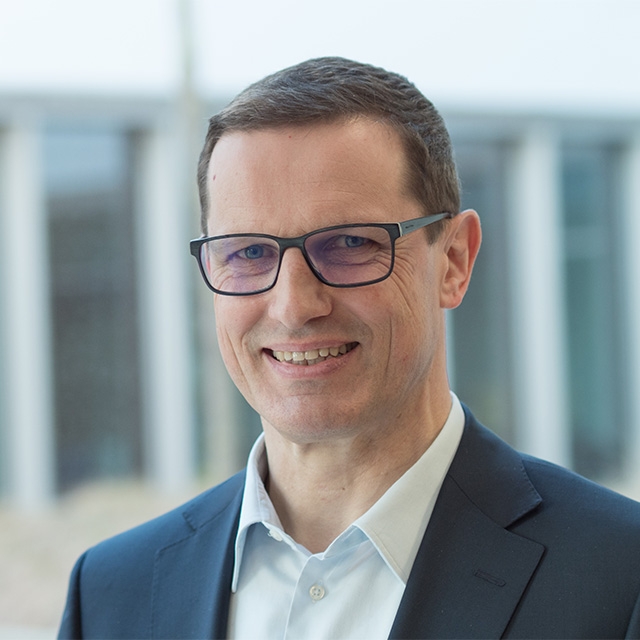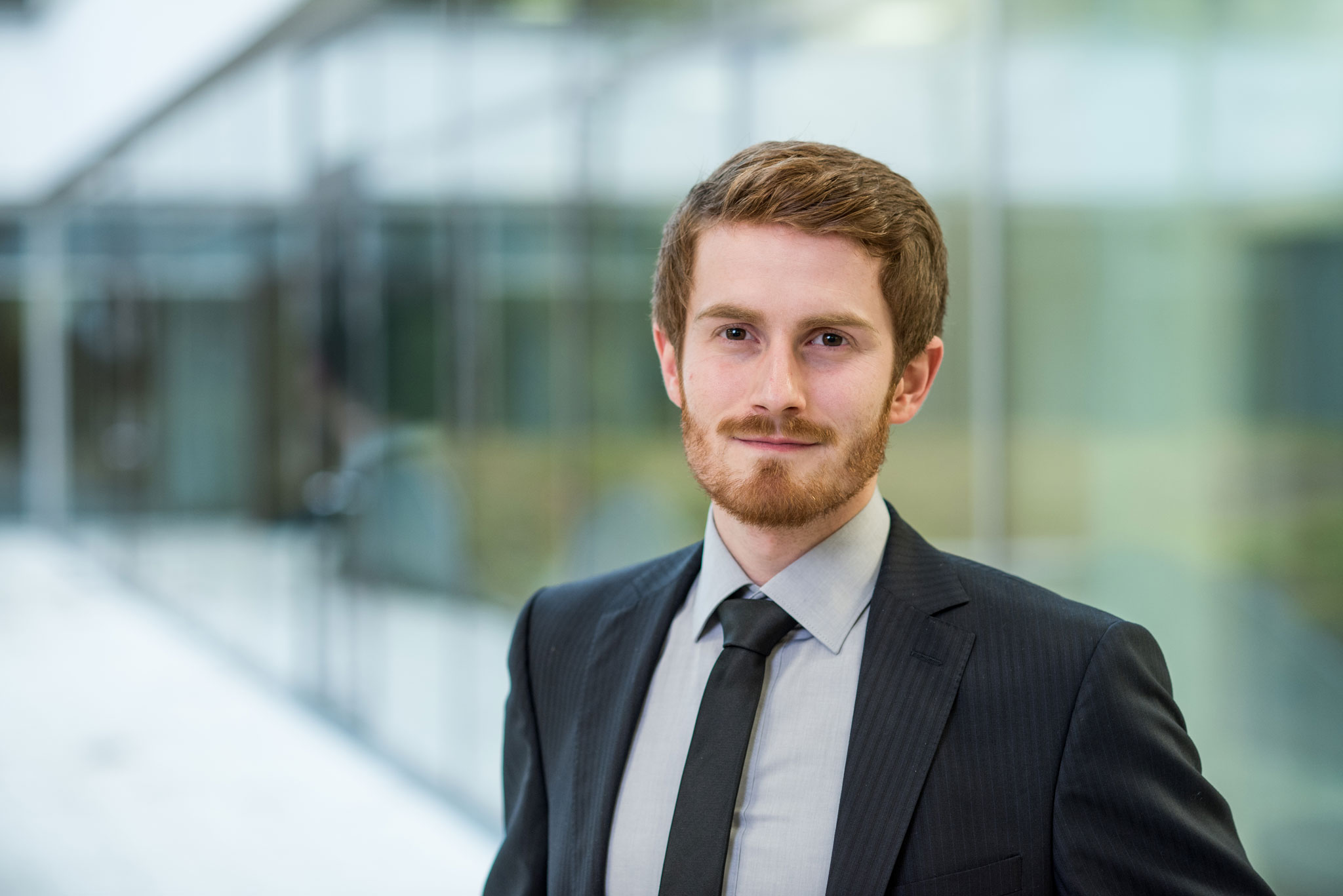BayQS addresses quantum computing from the aspects of security, robustness and optimization. Fraunhofer IIS will contribute its experience and expertise in the field of QC‑based system optimization.
Prof. Alexander Martin, Director of Fraunhofer IIS, explains: “Quantum computing is the next level for solving optimization problems. Accordingly, we will leverage our expertise in classical optimization and use it as a basis for researching the use of quantum computing to solve complex real-world application problems. We are working on QC-based optimization methods so that real-world problems in X-ray image reconstruction, beamforming in wireless communications, and planning and routing problems in logistics can one day be solved more efficiently.”
Quantum computing for optimization
May 26, 2021 | The "Bayerische Kompetenzzentrum Quanten Security and Data Science", or BayQS, was launched with a kickoff event on April 29, 2021. The center’s main objective is to research and develop fundamental concepts and solutions, and also to evaluate prototypes in the field of quantum computing. Prof. Alexander Martin and Markus Weissenbäck attended the event. Here, they explain how Fraunhofer IIS plans to use quantum computing to optimize methods and applications.
QC solves mathematical optimization problems in X-ray computed tomography
At BayQS, our goal is to enable quantum-computer-driven image and signal processing for imaging, sensor technology and signal processing at the Development Center for X-ray Technology. We focus on the use of QC to solve mathematical optimization problems efficiently. These kinds of problems occur both in signal reconstruction and in planning the optimum use of sensor technology.
What this means specifically can be explained using X-ray computed tomography – a 3D-imaging technique used in industrial measurement technology – as an example. Here, quantum computing can solve problems that arise in computed tomography reconstruction, as well as complex combinatorial optimization problems for CT measurement planning.
Quantum-based learning methods deliver results for wireless IoT systems faster and more efficiently
In the fields of localization and connectivity, we examine hybrid quantum algorithms for solving dynamic – that is, time-dependent – optimization problems. These include, for instance, sequential decision problems and problems relating to control complex systems.
We are already successfully using reinforcement learning methods to automate data-driven learning of appropriate rule and control strategies for these kinds of problems. Furthermore, because they specifically exploit quantum mechanical effects, quantum algorithms and quantum machine-learning methods offer the potential to accelerate these learning methods and make them more efficient, thus reducing the amount of data required, for instance.
Specifically, we investigate quantum algorithms and quantum machine-learning methods for the MIMO (multiple in, multiple out) beamforming use case, a very computationally intensive technique for producing directional radio channels.
One conceivable scenario for wireless IoT systems in industry might be considerably more efficient computation for learning methods. This would make it possible, for instance, to realize faster, more energy-efficient and more precise adjusting of antenna and radio systems to situationally changing environmental conditions for mobile industrial applications. Quantum-based learning methods can deliver the decisions and results for this faster and more efficiently.
QC offers advantages in computing complex optimization tasks in logistics
Many issues and challenges in logistics, such as those in planning and routing, can be formulated as mathematical problems and subsequently solved with algorithmic methods.
One fundamental problem that many common quantum algorithms share is the demands they place on hardware: for realistic problem sizes, these demands are so great that they cannot be met by existing or even planned quantum computers. In an attempt to circumvent this problem, hybrid variational approaches have been used, such as the Variational Quantum Eigensolver. In this approach, classical algorithmic methods for solving optimization problems are combined with quantum algorithms to best exploit even the smallest quantum resources.
Quantum computers are superior to digital computers
Markus Weissenbäck is head of the Optimization group in the Supply Chain Services division and contributes his expertise in mathematical optimization methods in a quantum‑computing context: “Quantum computers are superior to classical computers. They are characterized by quantum mechanical superposition, entanglement and interference, and they are suitable for solving special problem classes, especially optimization problems. They will most likely be used as co-processors in high-performance computing clusters. For us as researchers, it is a major challenge to identify and develop potential applications with the error-prone quantum hardware currently available.”
Exclusive access to the European IBM quantum computer
In February 2021, the Fraunhofer-Gesellschaft gained exclusive access to IBM Q System One, the European IBM quantum computer in Ehningen (near Stuttgart), with the aim of researching and developing new technological solutions in quantum computing. This state-of-the-art quantum computer provides the German business and innovation landscape with a number of application-specific research and development opportunities. It does this by offering scientists the option of testing their own algorithms on the German IBM quantum computer under German data protection and IP law.
New offers for pioneering collaboration
BayQS is a joint project involving several Fraunhofer institutes and academic partners, led by the Fraunhofer Institute for Applied and Integrated Security AISEC in Garching, near Munich. The Fraunhofer Institute for Cognitive Systems IKS in Munich and Fraunhofer IIS, headquartered in Erlangen, are also involved. The project’s academic partners are the Technical University of Munich, Ludwig-Maximilians-Universität Munich and the Leibniz Supercomputing Centre.
BayQS general management is developing the framework for international exchange with scientists through, for instance, scientific symposia, and is taking steps to encourage the next generation of scientists – through an international summer school, for example.
A planned industry workshop will bring partners from industry, science and politics into the conversation. Research institutions will present their research projects and potential applications. Industry partners will have the opportunity to present and discuss their own use cases and obtain an overview of the potential opportunities quantum computing offers for their sector. They will also be able discuss partnerships for initial pilot and test implementation and follow-up projects.
Professional development and training opportunities focus on two target groups. The first is corporate decision-makers or technology scouts who want to get an idea of the potential opportunities and risks of quantum computing for their companies. They should be given the necessary background information on the status and development outlook for the hardware and software technologies, as well as the tools for analyzing potential to help them make their investment decision. The second group includes developers, data scientists and security analysts who would need to be trained in the technologies, algorithms or programming languages developed within the scope of the project.
The Fraunhofer Academy, with its Fraunhofer Data Scientist Certification Program and Learning Lab for Cyber Security, already has an existing infrastructure for professional development opportunities with established sales channels and marketing instruments that could be used for the new content.


